Welcome to your ultimate NCLEX practice questions and nursing test bank for mental health and psychiatric nursing. For this nursing test bank, test your knowledge on the concepts of mental health and psychiatric disorders. This quiz aims to help students and registered nurses grasp and master mental health and psychiatric nursing concepts.
Mental Health and Psychiatric Nursing Test Banks
In this section, you’ll find the NCLEX practice questions and quizzes for mental health and psychiatric nursing. This nursing test bank set includes 700+ practice questions divided into comprehensive quizzes for mental health and psychiatric nursing and a special set of questions for common psychiatric disorders. Use these nursing test banks to augment or as an alternative to ATI and Quizlet.
Quiz Guidelines
Before you start, here are some examination guidelines and reminders you must read:
- Practice Exams: Engage with our Practice Exams to hone your skills in a supportive, low-pressure environment. These exams provide immediate feedback and explanations, helping you grasp core concepts, identify improvement areas, and build confidence in your knowledge and abilities.
- Challenge Exams: Take our Challenge Exams to test your mastery and readiness under simulated exam conditions. These exams offer a rigorous question set to assess your understanding, prepare you for actual examinations, and benchmark your performance.
- You’re given 2 minutes per item.
- For Challenge Exams, click on the “Start Quiz” button to start the quiz.
- Complete the quiz: Ensure that you answer the entire quiz. Only after you’ve answered every item will the score and rationales be shown.
- Learn from the rationales: After each quiz, click on the “View Questions” button to understand the explanation for each answer.
- Free access: Guess what? Our test banks are 100% FREE. Skip the hassle – no sign-ups or registrations here. A sincere promise from Nurseslabs: we have not and won’t ever request your credit card details or personal info for our practice questions. We’re dedicated to keeping this service accessible and cost-free, especially for our amazing students and nurses. So, take the leap and elevate your career hassle-free!
- Share your thoughts: We’d love your feedback, scores, and questions! Please share them in the comments below.
Recommended Resources
Recommended books and resources for your NCLEX success:
Disclosure: Included below are affiliate links from Amazon at no additional cost from you. We may earn a small commission from your purchase. For more information, check out our privacy policy.
Saunders Comprehensive Review for the NCLEX-RN
Saunders Comprehensive Review for the NCLEX-RN Examination is often referred to as the best nursing exam review book ever. More than 5,700 practice questions are available in the text. Detailed test-taking strategies are provided for each question, with hints for analyzing and uncovering the correct answer option.
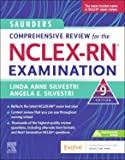
Strategies for Student Success on the Next Generation NCLEX® (NGN) Test Items
Next Generation NCLEX®-style practice questions of all types are illustrated through stand-alone case studies and unfolding case studies. NCSBN Clinical Judgment Measurement Model (NCJMM) is included throughout with case scenarios that integrate the six clinical judgment cognitive skills.
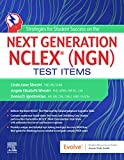
Saunders Q & A Review for the NCLEX-RN® Examination
This edition contains over 6,000 practice questions with each question containing a test-taking strategy and justifications for correct and incorrect answers to enhance review. Questions are organized according to the most recent NCLEX-RN test blueprint Client Needs and Integrated Processes. Questions are written at higher cognitive levels (applying, analyzing, synthesizing, evaluating, and creating) than those on the test itself.
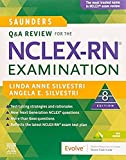
NCLEX-RN Prep Plus by Kaplan
The NCLEX-RN Prep Plus from Kaplan employs expert critical thinking techniques and targeted sample questions. This edition identifies seven types of NGN questions and explains in detail how to approach and answer each type. In addition, it provides 10 critical thinking pathways for analyzing exam questions.
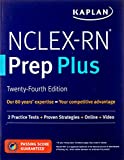
Illustrated Study Guide for the NCLEX-RN® Exam
The 10th edition of the Illustrated Study Guide for the NCLEX-RN Exam, 10th Edition. This study guide gives you a robust, visual, less-intimidating way to remember key facts. 2,500 review questions are now included on the Evolve companion website. 25 additional illustrations and mnemonics make the book more appealing than ever.
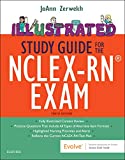
NCLEX RN Examination Prep Flashcards (2023 Edition)
NCLEX RN Exam Review FlashCards Study Guide with Practice Test Questions [Full-Color Cards] from Test Prep Books. These flashcards are ready for use, allowing you to begin studying immediately. Each flash card is color-coded for easy subject identification.
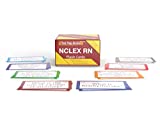
Recommended Links
An investment in knowledge pays the best interest. Keep up the pace and continue learning with these practice quizzes:
- Nursing Test Bank: Free Practice Questions UPDATED!
Our most comprehenisve and updated nursing test bank that includes over 3,500 practice questions covering a wide range of nursing topics that are absolutely free! - NCLEX Questions Nursing Test Bank and Review UPDATED!
Over 1,000+ comprehensive NCLEX practice questions covering different nursing topics. We’ve made a significant effort to provide you with the most challenging questions along with insightful rationales for each question to reinforce learning.
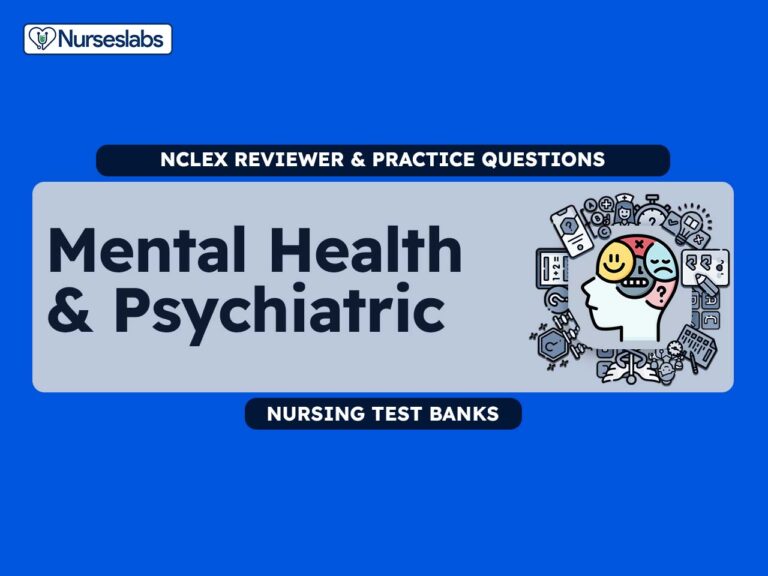
This is the best website for nursing EVER, i love you so much people who are behind this great hard work i’m speechless… Wish you all the good luck and i wish I could help you with anything ❤️❤️❤️❤️❤️❤️
Thank you so much for your kind words :)
Thank you so much for this! Great help really..lots of love to you all!
This site is helpful. Good job 👏
Thank you Nurseslabs
After completing the quiz, results do not populate and there is no rationale as you go through each question, so you cannot learn.
Hello, after the quiz, click on the “Quiz Summary” button then “Finish Quiz” button. It should give you the option to review the questions and the rationales (by clicking “View Questions”).
I really love this website because it is really helping me for my Nclex review 👍🏽👍🏽👍🏽❤️
I am content with this website. I adhere to this website when I prepare my nursing school care plans, study for tests, and find new information. Thank you for helping me through the struggle.
I never thought practicing the content of the Psychiatric Nursing questions here would help me succeed in my certification exam. Now, I am a Psychiatric Mental Health -Board Certified (PMH-BC). Thank you for preparing those questions, it is a great site for reviews.
Congratulations! :)
I am in doubt of 43rd question of anxiety disorder
question asking the side effect of Ritalin- the correct answer here is increased attention span and concentration. This is actually the therapeutic effect of this medication. As far as I know, the main side effect is sleeplessness. therefore, this medication should be given before noon to avoid sleeping problems.
please check and let me know too
thank you
We’re working on a way to have the questions printed.
Please install print option very fast,it exam time,we have not enough time to right all these questions,ln 2020 there is easy to print all the questions in pdf format.
You can print these questions or the webpage by clicking on the Quiz Summary > Finish Quiz > View Questions > Then go to File > Print > Save as PDF.
I’m studying for my psych certification and I have to say, I’m impressed by and love the 700 of psych questions with rationales. The only downside is that it doesn’t save your progress so if you can’t finish the test in 1 sitting, you have to start all over again. That’s the only annoying part, but I love this website.
Hi!
Thank you that I found this website. This is very helpful. I was able to open the test or practice test before but when I click the start again I cant go through it.
Very very good
Great questions with rational a lot of love this website again and again thank
I’m preparing to take NCLEX-RN this year, but I need to practice more in Phycology as I have a hard time in it. I found the NursesLab web site very helpful and I want to practice more, however, I cant open the practice question test bank. Kindly help.
Thank you
Please what are the score projection needed on this test to assure success in the nclex. Thanks you for your incredible work.
This site is of great help to us who are going to take the NCLEX RN exam.
Thank you
It is quite helpful rather than reading a text book. This help to get use of how the questions should be tackled.
Thank you a million to all Nurseslabs who made this content. Much helpful.Blessings.
I am using this site to prepare for my NCLEX RN examination. I am pleased with my success with the questions and still learning more. I will return to say thank you again to Nurseslabs as soon as I sit my exams as I believe I will pass at my first and only sitting. Thanks for putting this up.
Good luck, Debby!
That’s perfect! Thanks for your excellent site!
One of the best nursing sites ever. 🌸
Thank you! ☺️
Great work
Really so useful and helpful collection of questions
Thank you alot ..and waiting for more creativity ❤️❤️
This is a great website & I appreciate all of the practice quizzes so much! I did want to point out that it seems like the substance abuse quiz starts being about depression and mania halfway through? It’s just confusing because the questions completely stop addressing substance abuse at all.
Thank you so much 🙏 wonderful site. Helps me tremendously
I see you’re a Game of Thrones fan. Great quizzes.
Hi Nurseslabs,
Thank you for providing such helpful question banks.
May I clarify the question in number 65, is it asking for the therapeutic effects or side effects of RITALIN? thank you!
This helped me in reviewing my class. Thank you and God bless.
Thank you so much, it was very much educative.
Thank you so much
We are writing exams on Monday and I want you to help me get some questions both theories and objectives because l don’t where she will set her questions from .The course is Mental Health Assessment and Therapies